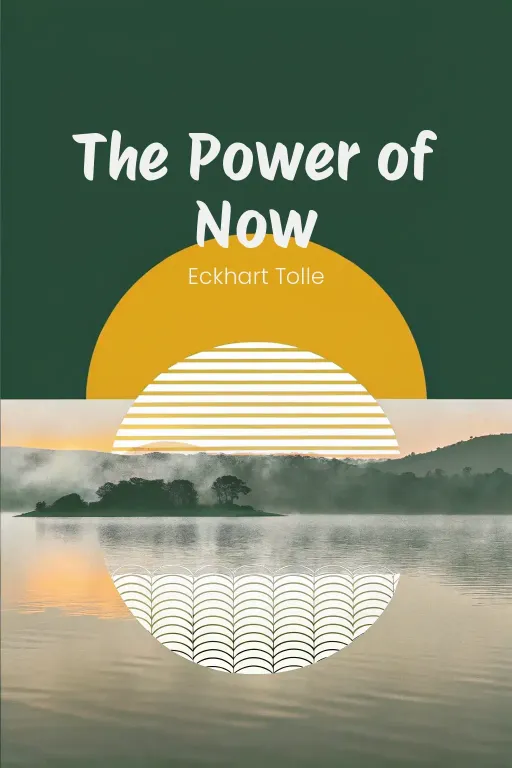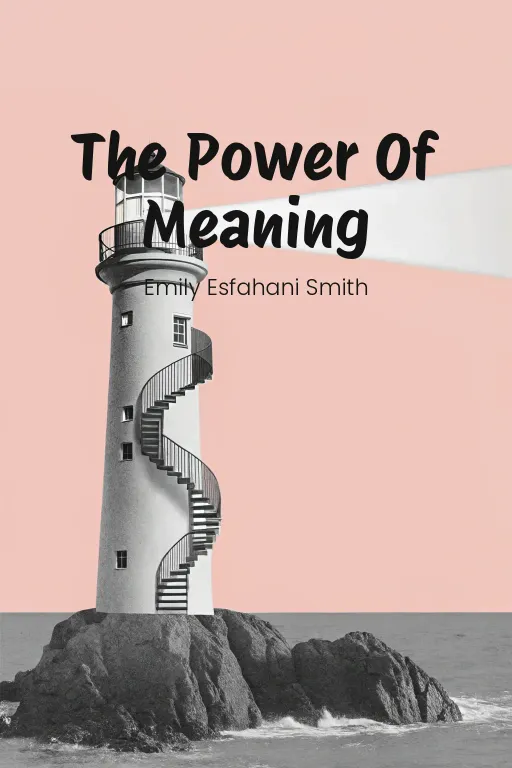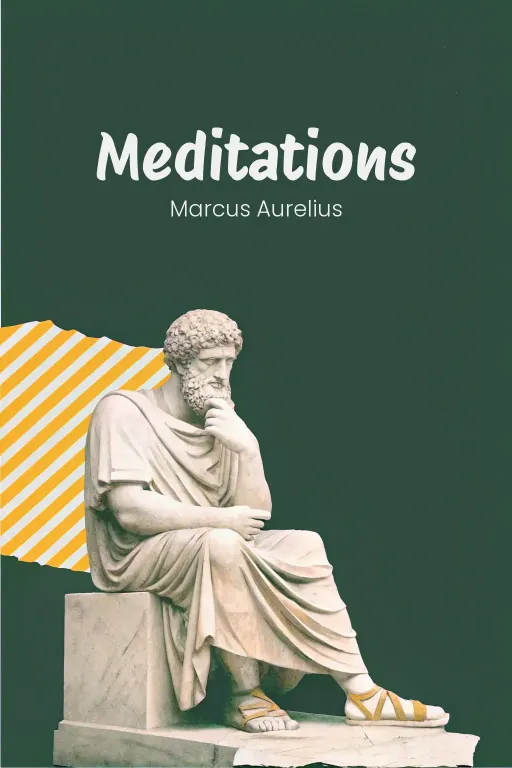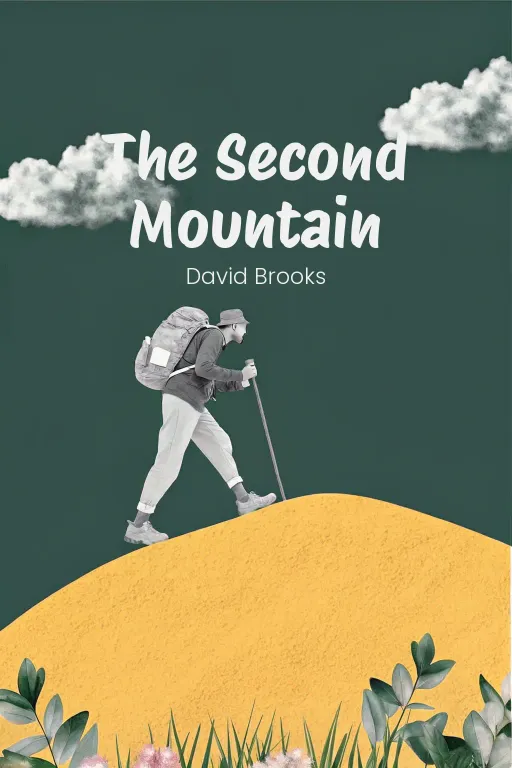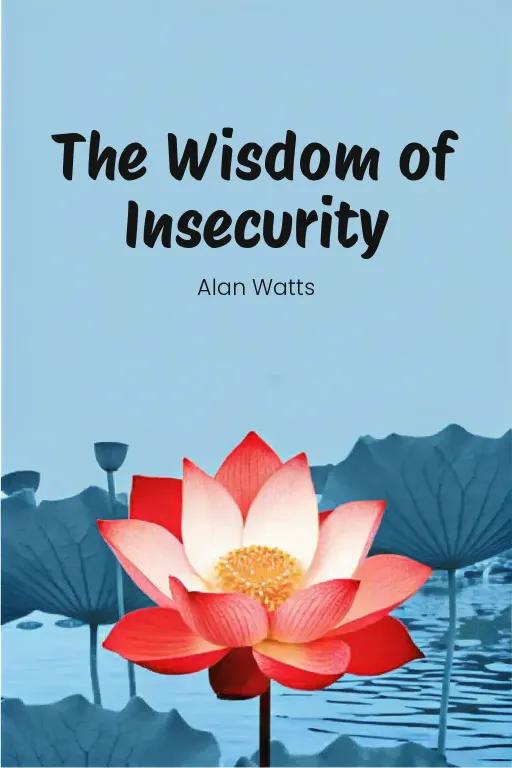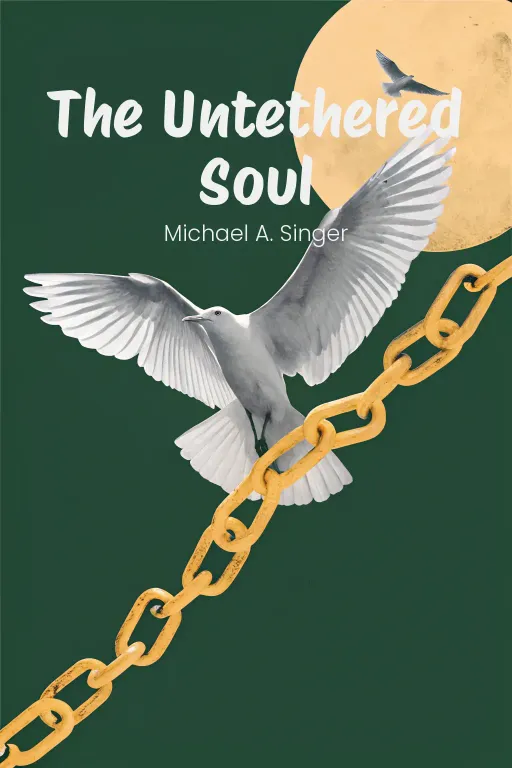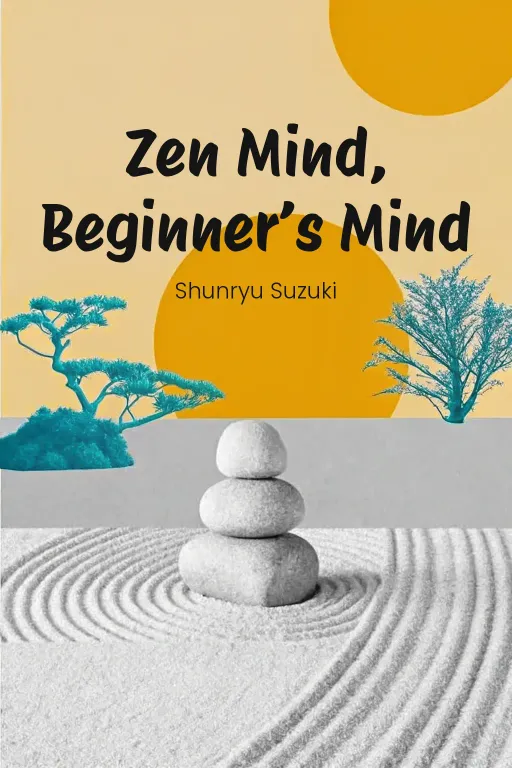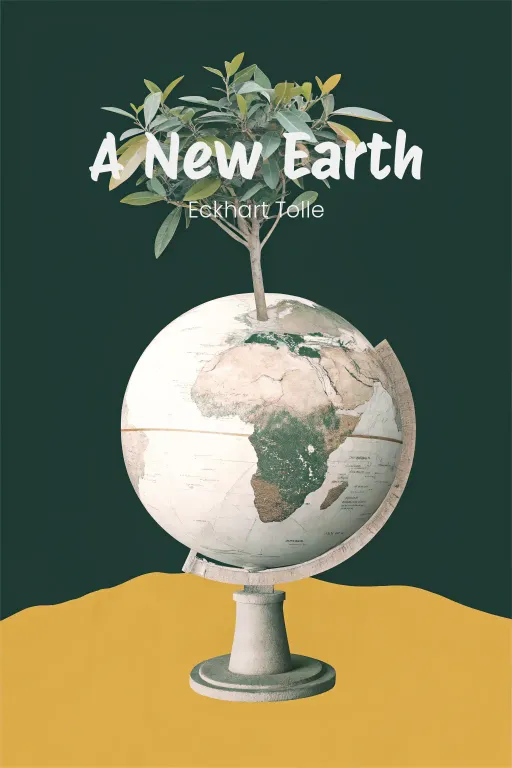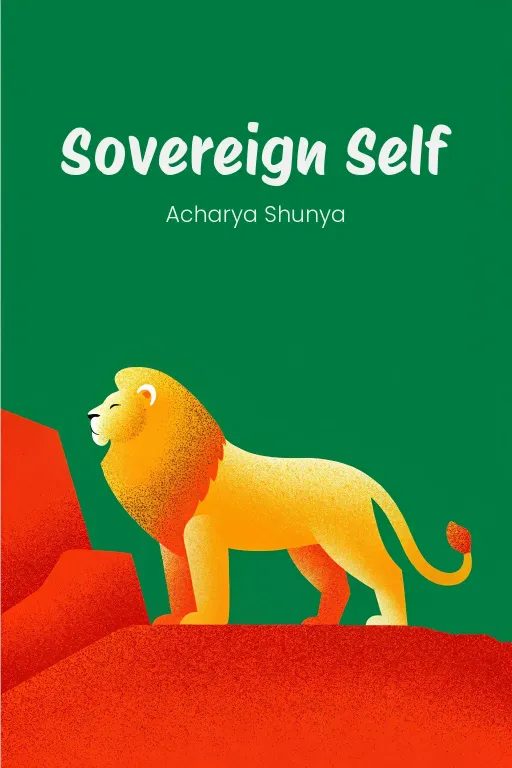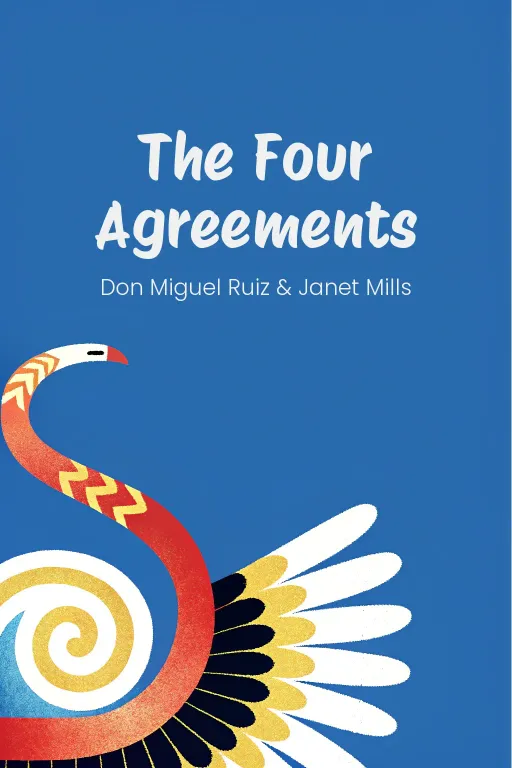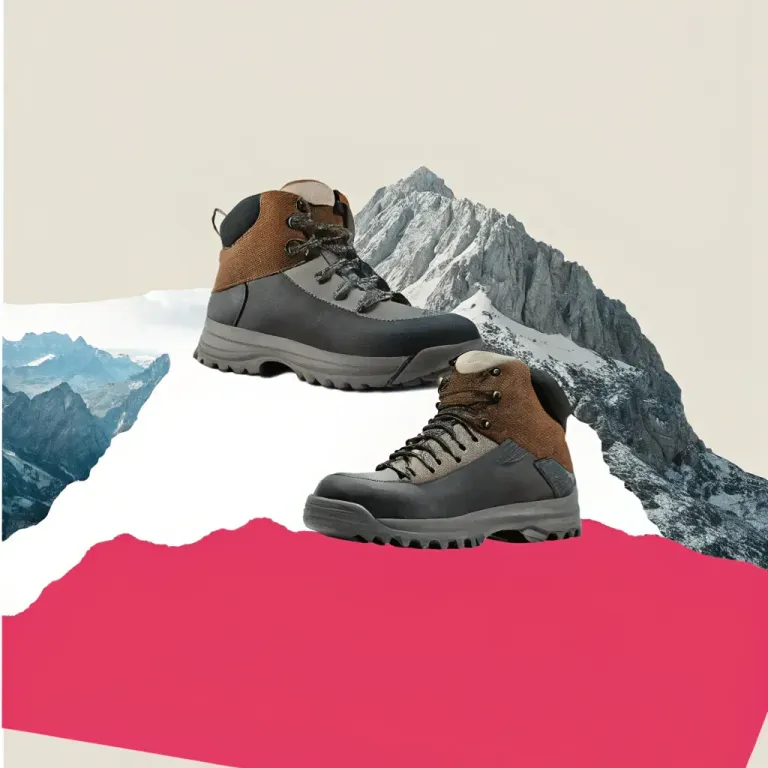
Find Your "We": Redefine Success
Podcast by The Mindful Minute with Autumn and Rachel
The Quest for a Moral Life
Find Your "We": Redefine Success
Part 1
Autumn: Hey everyone, welcome! Today we're tackling something that could totally change how you see your life's purpose. Picture this: you're at the peak of success—career's booming, awards are piling up—but instead of feeling great, you're just… empty. Ever been there? Rachel: Ah, the old "I've got everything, so why am I still bummed out?" story. Sounds like the intro to every mid-life crisis movie ever made. Autumn: Exactly! But David Brooks, in his book “The Second Mountain: The Quest for a Moral Life”, argues that it’s more than just a cliché—it's actually a roadmap to real change. He believes that when chasing personal success starts to feel meaningless, it's a sign that we need to climb a different mountain, one that's all about purpose, love, and helping others. It's about shifting from focusing on ourselves to connecting with something bigger. Rachel: So, mountain number one is all about "look at me," and mountain number two is whispering "we're in this together"? Autumn: Exactly! And Brooks doesn't just talk about it; the book's full of great stories and real-life examples that show how committing to things like relationships and community can lead to a much more fulfilling life. Rachel: Okay, I'm listening. So, what's our plan of attack for today? Autumn: We'll start by breaking down this whole two-mountain idea—what each one represents and how those tough times in between can actually help us grow, does that make sense? Then, we'll dive into Brooks' "four commitments," the key things that can anchor us to a life that truly matters. And finally, we'll look at the shift from "me" to "we" in our culture, and what it really means to live in connection with others when the world's pushing us to be individuals. Rachel: Mountains, commitments, and a cultural sea change— that's a tall order. Let's see if Brooks' "moral quest" can “really” deliver.
The Two Mountains Metaphor
Part 2
Autumn: Okay, so let’s dive right in. This "two-mountain" idea from Brooks? It's basically a roadmap for life. He describes the first mountain as chasing everything society tells you to want – success, recognition, the whole deal. It’s like the default mode we all start in. Rachel: Yeah, that climb that begins with getting into the "right" school, then the "right" job, maybe the "right" car... and ends, I suspect, with a midlife crisis and some seriously expensive hobbies. Autumn: Precisely! Brooks argues that the story we're sold—that personal achievement equals happiness—is a bit of a letdown. The higher you climb, the more you realize that even with the awards and praise, something's still missing, right? Rachel: But is it really that black and white, Autumn? I mean, plenty of people genuinely enjoy their careers and what they've earned. Does Brooks think ambition is inherently bad? Autumn: Not at all. He's careful to say that the first mountain isn't “wrong”, it's just… “incomplete”. It’s the story of the "insecure overachiever" that really highlights the trap. You know? Rachel: Ah, yes, the overachiever – chasing those gold stars like they’re competing in the Olympics. Autumn: Exactly! Brooks talks about how these people—despite all their visible success—often feel kind of empty inside. They're always comparing themselves to others, never feeling truly "enough," you know, and that creates this feeling of being alone. It’s like the downside of being too focused on yourself. Rachel: Okay, so this first mountain sounds exhausting. You climb to the top, and someone just pulls the rug. What happens then – you just fall into nothingness? Autumn: Pretty much! Brooks calls it "the valley." It’s that moment when the promises of the first mountain just fall apart. Maybe it's losing someone you love, a career setback, or just one day waking up and feeling totally unfulfilled. The valley makes you stop and think, "Is this really what I want my life to be?" Rachel: Alright, cue the existential dread. But Autumn, let's be honest here: people don't just sit in despair and suddenly think, "Ah, time for mountain number two." What actually makes them want to move on? Autumn: That's the million-dollar question. Brooks thinks it often takes suffering – real suffering – to shatter the illusions of that first mountain. Look at his example of Leo Tolstoy. Here’s a guy who’s famous everywhere, wealthy, brilliant and yet he finds himself almost giving up. Rachel: Tolstoy himself? The literary titan, secretly struggling with the big "What's the point?" existential question? Autumn: Yeah. His fame didn't stop him from questioning life’s purpose. And instead of staying stuck in that place, he used it to make a major shift. He looked again at what he valued and then dedicated himself to a life of moral purpose – you know, to faith, to serving people, and writing for the common good. Rachel: So, the valley changes him. Makes sense. Though I have to wonder – what about people who don't hit that wall? Is the second mountain only for those who've suffered? Autumn: That’s a good point. Brooks argues that a crisis just speeds things up, but it’s not the only way to get there. Some people decide to climb the second mountain on purpose by deciding to value different things. It's about waking up, realizing the deeper, relational joys in life. Rachel: Okay, let’s climb this “second mountain," then. What does it actually look like? Autumn: The second mountain is where everything flips—from ‘me’ to ‘we’. Instead of asking, "What can I get for myself?" you're asking, "How can I contribute, and how can I connect with the people around me?” Brooks talks about making commitments – what he calls the "four commitments" to a vocation, to your spouse and family, to some kind of philosophy or faith, and to your community. Rachel: And these commitments, I assume, are just what you need to fight against the ‘me-first’ thinking of the first mountain? Autumn: Exactly. Take thriving in your vocation – on the first mountain, your career is about climbing the ladder. But on the second mountain, your work becomes something you care about. It’s about helping something bigger than yourself. Rachel: Let me guess—this is the part where community suddenly becomes very important? Autumn: Huge! Brooks really emphasizes what he calls "moral ecologies." These are value systems within communities that focus on connection, generosity, and supporting each other. Rachel: Which is basically opposite of the “me-first” way everyone thinks today. That sounds lovely, but how does it actually work? Autumn: Brooks shares this story about Asiaha Butler, who could have left her struggling neighborhood in Chicago but chose to stay and give back. She started community gardens, organized block parties, and made places where people could connect again. Her story shows how people can change their communities by choosing to invest and stay instead of leaving when things get tough. Rachel: So instead of escaping, she rebuilt things right where she was. But Autumn, a skeptic might say, “Okay, that worked for her, but what if I live somewhere where ‘connection’ feels like something from another planet?” Autumn: And Brooks would probably say: start small. Connecting isn’t about doing big, showy things—it’s about just showing up consistently. Whether it’s cleaning up the neighborhood, getting to know the people next door, or volunteering somewhere, these little things build a base for deeper connections over time. Rachel: I have to admit, it's compelling – this idea of structuring your life around commitments. But are we really built for that, or does it go against how our hyper-connected, always-online society works? Autumn: That's the million-dollar question, isn’t it? Brooks knows that our culture often pushes us the other way, valuing independence over working together. But he also says that our deepest joy comes from deep relationships – much more than the fleeting happiness that first mountain offers. Rachel: Joy versus happiness… interesting distinction. Joy lasts longer, right? Autumn: Yeah, definitely. Happiness is often about external things – money, awards, feeling good. Joy, on the other hand, comes from forgetting about yourself, from giving without expecting anything back. It’s what the second mountain is all about. Rachel: Alright, Autumn, you’re making a strong argument for trading "me" for "we." I'm starting to wonder if I've been trying to climb the wrong mountain all this time.
Commitments and Community
Part 3
Autumn: So, from feeling like material success is a bit of a letdown to embracing something deeper, we're diving into the core of Brooks’ ideas now—these "four commitments" that really ground the second mountain climb. We're talking about commitments to vocation, marriage and family, faith or philosophy, and community. They’re not just nice ideas; they're the base for a meaningful life. As priorities shift, people dig into these commitments, building strength and community ties. Rachel: So, Brooks is giving us a life GPS—"recalculating" from chasing personal wins to helping everyone thrive. OK, let's get specific. What's the first "commitment" on this second mountain? Autumn: It's vocation. But, you know, Brooks isn't just talking about your day job, he sees it as a calling. Vocation is about matching what you're really passionate about with a purpose that helps others. It's that perfect spot where your skills meet the world's needs. Rachel: A calling, huh? That sounds intense, like a lot of pressure. What if you don't hear a voice saying, "You're meant to be a sculptor," or "Go start a charity in Africa"? Autumn: It's not usually that dramatic! A calling often appears gradually. Brooks mentions "annunciation moments," those key experiences where things click. Sometimes it's subtle—a conversation or something you see that sparks something. Other times, it's bigger, like seeing an injustice that makes you want to act. Rachel: Like the teacher in the book who brings something special to the classroom, inspiring kids in ways a textbook can't. I get how that’s vocational, but what if your "aha" moment takes you off the career path you’ve already built? Would Brooks say go for it? Autumn: Definitely, if it means better aligning what you love, what you believe in, and how you serve others. He says a real vocation often seems risky. But those who take the leap get more than just a paycheck—they get real satisfaction. Rachel: Alright, purpose-driven workday, check. What's the next commitment? Autumn: Marriage and family, which Brooks sees as a really deep commitment to each other. "Maximal marriage," as he calls it, is where the relationship helps both people grow. It’s about shared goals, being open, and learning together—not just going through life as housemates. Rachel: Okay, that's beautiful, but aren't long-term marriage commitments… well, not as common these days? Autumn: It’s true that ideas about marriage and relationships have changed. But Brooks makes a good point that deep, lasting love—like the poet Jack Gilbert’s love for his wife Michiko—adds a lot to life. Their relationship wasn't about big romantic gestures; it was about everyday things, like planning their future together or supporting each other through tough times. Rachel: Love in the little things. I like that. But Gilbert staying connected to Michiko even after she died—that’s intense. Does Brooks talk about how people build that kind of closeness? Autumn: He does, outlining ways to build deeper connections. One way is to intentionally deepen intimacy over time—going beyond surface-level affection and embracing vulnerability. Think about those late-night conversations where you share your real fears and dreams. Rachel: Vulnerability, huh? Sounds… scary. Autumn: It can be, but it’s also freeing. Brooks also talks about forgiveness and empathy. Conflict is inevitable in relationships, but when couples try to understand and forgive each other, it makes the relationship stronger, so it can handle challenges. Rachel: So, marriage as a lab for connection. A place to learn patience, empathy, and—let’s be honest—humility. Got it. What’s next? Autumn: Faith or philosophy—basically, your personal way of understanding life. For some, it’s religious faith; for others, a guiding philosophy. Either way, it gives you clarity and conviction in a world that can feel confusing. Rachel: Okay, but isn't faith—or even philosophy—hard for most people to define? Especially if they feel let down by strict religion or aren't sure what they believe? Autumn: That’s what’s great about Brooks' approach. He doesn’t limit faith to organized religion. He’s talking about making an effort to think about the bigger questions: Why am I here? What do I stand for? He mentions the Exodus story—a universal story about freedom, struggle, and responsibility. Rachel: Right, the Israelites’ journey. It’s not just about escaping slavery; it’s about learning how to handle freedom while staying morally grounded. Sounds like a human story about dealing with big life changes. Autumn: Exactly. And Brooks suggests daily practices, like reflection or mindfulness, to keep us aligned with those principles. Faith and philosophy help us handle tough times and keep our values strong. Rachel: Alright, so we’ve found purpose in vocation, love in marriage and family, and meaning in faith or philosophy. That leaves… Autumn: Community. It’s the last and maybe the most transformative commitment. Brooks says our society focuses too much on individualism—chasing personal success, isolating ourselves with technology—which has cut us off from community life. Rachel: Yeah, just look at our neighborhoods. How many people actually know their neighbors? Autumn: Exactly. Brooks talks about Asiaha Butler from Englewood, Chicago. She could’ve left the neighborhood because of its problems, but she stayed and helped rebuild it. Through community gardens and movie nights, she created connections and trust among her neighbors. Rachel: So she didn’t try to be a hero but really got involved. That’s the kind of real change that makes a difference. But for those of us who aren’t natural leaders, what’s the first step? Autumn: Start small. Brooks says consistency is more important than doing big things. Even simple things—getting to know your neighbors, organizing a local event—can create connections. Rituals and traditions strengthen these bonds, creating a shared sense of identity over time. Rachel: So the solution to feeling isolated isn’t some huge social change; it’s showing up, again and again, for the people around you. Autumn: Exactly. Community builds strength not just for individuals but for society. It’s where we learn to be generous, take responsibility, and build the connections that make life meaningful. Rachel: I’ll admit, Autumn, these commitments make the second mountain seem… worth climbing. But it’s also clear this isn’t a quick fix. It’s a lifelong journey—a marathon, not a sprint. Autumn: That’s what it’s all about, Rachel. It’s about showing up, building relationships, and embracing purpose. The second mountain isn’t about the destination; it’s about how much we put into the journey—and into each other.
Relationalism as a Cultural Shift
Part 4
Autumn: So, from transforming ourselves to impacting our world, Brooks broadens the discussion, arguing that moving away from extreme self-focus to prioritizing relationships isn't just a personal change; it's a societal one. He believes our shift toward individualism has made us isolated, but relationalism can rebuild trust, connections, and shared goals. Rachel: A complete cultural shift, huh? That's a bold claim. Autumn: It is! Brooks contrasts the effects of individualism with the potential of relational approaches. He argues that individualism's emphasis on self-reliance alienates us, while relationalism values interdependence and community, pushing for systemic change. Let's dive in. Rachel: Okay, isolation versus connection – a big topic. Where do we begin? Autumn: With the consequences of hyper-individualism. Brooks paints a grim picture: prioritizing personal gain has eroded trust and deepened loneliness in society. Rachel: That sounds right. We're supposedly more "connected" than ever, yet studies show record-high levels of loneliness. The more we focus on ourselves, the more fragmented we seem to become. Autumn: Exactly. Brooks links this to hyper-individualism's damaging effects. It's not just isolating; it fosters a culture of competition. People seek success for personal validation, which damages the communal ties that once gave life meaning. Rachel: Right, our value is tied to metrics – likes, votes, promotions – instead of relationships. But hold on, Autumn, we embraced individualism for a reason, didn't we? How does Brooks address that? Autumn: He doesn't dismiss the value of individualism completely; things like self-discovery and independence are important. But taken to the extreme, it overshadows our collective identity. Even worse, it can create a moral void where people feel lost, wondering, "Where do I fit in the bigger picture?" Rachel: Okay, so Brooks thinks we need shared purpose. How does relationalism change things? Autumn: Relationalism puts relationships back at the center of a meaningful life. It encourages us to move away from the "what's in it for me?" attitude and toward a culture of empathy and responsibility to each other. Rachel: But isn't empathy hard to cultivate in a society built on competition? Autumn: That's why Brooks uses real-world examples of relationalism. Like the rebuilding efforts after disasters, take Prince Holmes, director of Youth Rebuilding New Orleans. Holmes allowed people who’d never met to rebuild homes side by side, emphasizing that collaboration not only restores structures but also forges bonds. He says, “You can build a wall with a stranger, and that bond becomes lasting.” Rachel: So, literally breaking walls to build relationships—that’s poetic! But I have to ask… do we really need something as big as a natural disaster to pull this off? Autumn: Not at all. Brooks emphasizes that relationalism begins with our everyday choices—small acts of kindness and engagement repeated over time. And the results are amazing. Take revitalizing traditions, for example. Brooks tells the story of Ruthie Leming, who started a tradition of lighting candles for the deceased each Christmas Eve in her small town. What began as something personal grew into something collective. Rachel: And after Ruthie passed away, her neighbors continued the ritual, carrying on her legacy. That's powerful – the idea that small traditions can create huge connections over time. Autumn: Exactly. It's through these shared efforts and rituals—even mundane activities, like washing dishes together, as in that dishwashing diplomacy example between King Hussein and Shimon Peres—that community is built. Rachel: Okay, relationalism is sounding... intimate. But Autumn, not everyone's built for that. What about introverts or people who avoid conflict? Does Brooks just throw them into the deep end? Autumn: Good question. Brooks doesn't advocate a one-size-fits-all approach. Relationalism is based on being genuine, not forcing people into uncomfortable situations. For some, it might mean hosting block parties; for others, it's as simple as making time for heartfelt one-on-one conversations. Rachel: Vulnerable—that’s another big word. Do you think our hyper-digital society even leaves room for that? How do you get past carefully constructed profiles and 10-second TikToks? Autumn: It's challenging, but Brooks argues that even in this noisy world, creating "thick" relationships is still possible. These are deep, meaningful connections that develop when we invest time and care in others—listening, sharing, and building trust. Rachel: So, "thick" over "thin." No quick wins – sounds like this isn't compatible with our convenience-driven, fast-paced culture. Autumn: It's not a quick fix, and that's the point. Brooks calls it a cultural shift. Relationalism requires effort because community and connection aren't instant – they're built through patience and dedication. Rachel: Alright, I’ll admit, the Hospice of Individualism sounds grim. But communal rebirth? That’s optimistic. What’s Brooks’ final takeaway on relationalism for our society? Autumn: His message is that healing the fractures of modern life – loneliness, distrust, disconnection – starts with something as simple as showing up for each other. Whether it's rebuilding homes or just listening with empathy, every interaction moves us closer to joy and belonging. Rachel: Huh… maybe we’re not so hopeless after all.
Conclusion
Part 5
Autumn: Okay Rachel, time to bring it all together. Today, we dove deep into David Brooks’ "two mountains" framework. The first mountain, remember, is all about personal ambition and chasing success. Rachel: And then comes the second, which is about finding real depth in relationships, purpose, and contributing to something bigger than ourselves. Let's not forget that we also talked about the valley – that challenging period of transformation that “really” forces us to rethink our priorities. We also unpacked those "four commitments" essential for a meaningful life: your calling, your relationships, your fundamental beliefs, and your community. Oh, and relationalism, too, as a counterpoint to our very "me-first" culture. Autumn: Absolutely. Brooks is “really” pushing us to redefine what a successful life actually looks like. It's less about climbing the corporate ladder and more about finding real joy, satisfaction in relationships, purpose, and giving back. Rachel: It's amazing how relevant this concept is. Whether you are feeling lost or just thinking about where you're headed, the second mountain offers a path to connection—in your career, your relationships, and in your community. Autumn: Precisely! So, let's think about this: What if you chose commitment over convenience, lasting joy over temporary happiness, and "we" over "me?" Brooks isn't asking for perfection here; he’s inviting us to strive for something higher–together. Rachel: Yeah, it might start with simply showing up, not for the applause or the recognition, but just because you genuinely care. I mean, if that's not a climb worth making, I don't know what is.
